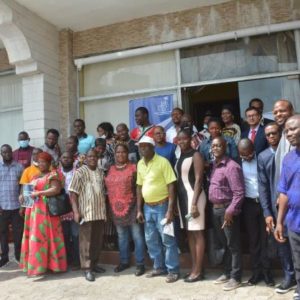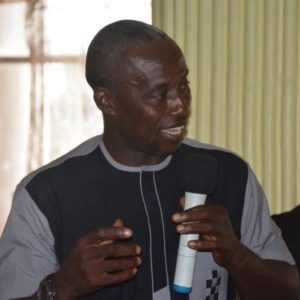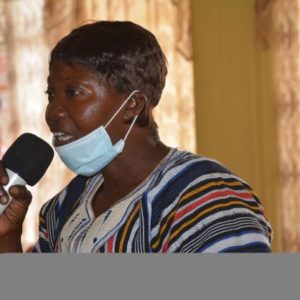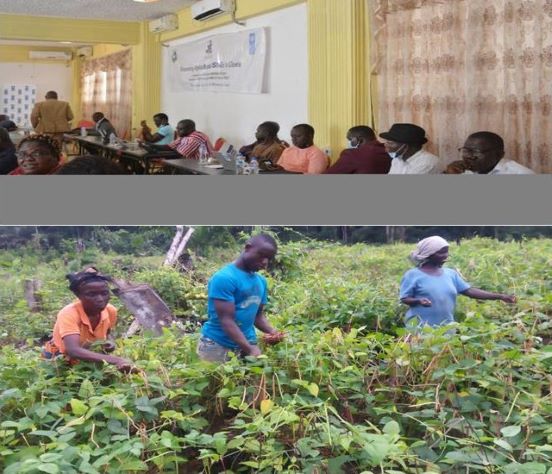PHOTO: Glimpse of a local farm (bottom) and agriculture stakeholders meeting (above)
By Frank Sainworla, Jr, fsainworla@yahoo.com
Liberia is known to have fertile soil, enough rain and sunshine, yet most of the food Liberians eat is imported, with some US$220 million of badly needed foreign exchange spent yearly even on the nation’s staple food, rice.
Why is this so? Despite the abundance of arable land, why aren’t Liberian able to feed themselves and eat what they grow?
At the weekend in a local hotel in Monrovia, the United Nations Development Programme (UNDP) held a day-long forum bringing together stakeholders drawn from various financial institutions and farmer organizations around the country. The forum, which this writer was fortunate to have sat in, was to validate proposals for developing financing products and mechanisms adapted for the unique needs of farmers, and how to spur MSMEs (Medium and Small Enterprises) in the agriculture sector.

The Friday, December 10, 2021 forum was triggered by a study carried out by the United Nations Capital Development Fund (UNCDF) and UNDP, which “found that farmers in Liberia are trapped in subsistence farming, because most financial institutions in the country have not developed specifically targeted loan products suitable to the needs of the country’s farmers.”
Issues laid bare
Farmers and others zeroed in some of the practical challenges and issues that have over the years been responsible for the faltering agricultural sector, with lack of adequate financing being one of them. But most of the participants were critical of the way millions of donor money to the sector had been managed in the past.
Liberian farmers, unlike other countries including developed nations, are not subsidized by government and in fact agriculture is not seen as a business. So, the discussions kicked off with a female in the sector stressing the need to prioritize organic farming and subsidizing Liberian and African farmers.
From the flow of the discussion, it was learned that there is a need to not only prioritize agriculture but have a priority list for the various aspects—food and vegetable production, including rise, cassava and animal husbandry. The official from the Liberian Business Association (LIBA) at the forum pointed out two major problems facing the country’s agricultural sector: lack of access to market and financing.


It was argued that donors and other financing institutions need to incorporate all farmers who are producing but not under the Cooperative Development Authority (CDA) or the Liberia National Credit Union (LCUNA) frameworks. This group of farmers also deserves technological support and supply of farming implements, it was suggested.
Effective needs assessment
For too long, some of the farmers argued, Liberian agriculture has been viewed primarily from the perspective of the Smallholder farming and capacity building has only been seen as training of personnel in the sector. But with effective needs assessment, building of capacity would mean upgrading to mechanized farming, thus graduating longstanding farmers to large scale farming.
Some of the farmers and stakeholders argued that experience has shown that whenever there is big donor money around, “overnight” farmers or farming institutions emerge and after the donors support dries up, they cease to operate, thus the need to make the agriculture sector sustainable.
It was recommended that the UNDP and other development partners set up a transparent committee to build the capacities of existing farmers and not just channeling support to cooperatives.
Claims of corruption in the sector
Lack of transparency and accountability is one issue that is said to be undermining the growth and development of the country’s agricultural sector. Farmers and other stakeholders spoke of the need to stamp out “corruption in the sector” in the operations of some groups providing support to farmers. “We farmers can’t trust some of those groups implementing various schemes, selection of beneficiaries is not transparent,” it was said.
Some are calling on donors put in place the right mechanisms for auditing of institutions and NGOs that manage funding aimed at improving agriculture, “so that the money can reach actual farmers”.
The farmers added: “There is a need for donors to follow their money, in order to ensure that it can reach farmers. Millions of US dollars pumped into agriculture and farmers not benefiting them. Liberia is still importing our staple food, rice. Bring the money this time with a good monitoring team,” farmers said.
One example many of them may have been reflecting on was the US$30 million provided for rice production by the late Libyan leader Colonel Muammar Ghadaffi for rice production in Liberia’s northwestern Lofa County, which squandered during the past Unity Party government regime.
There was an outcry that the Liberian government agriculture extension services are weak, with a question being raised as to who will take up that burden.
Finally, the farmers and agriculture stakeholders at last Friday’s forum emphasized the need for farming to be seen as a business. And that Liberians must go beyond traditional/subsistence farming, saying that’s the only way agriculture will have the needed impact.
The Researchers who carried out the recent UNDP study told the farmers that there are plans to upgrade the governance structure in managing the flow of assistance to the agriculture sector in the country. Earlier, they said loans will only be given to farmers with bank accounts and who are members of the Liberia Chambers of Commerce and other recognized groups.
According to the UNDP study, farmers in Liberia are trapped in subsistence farming, because most financial institutions in the country have not developed specifically targeted loan products suitable to the needs of the country’s farmers.
In a press UNDP press release issued at the weekend, UNDP Resident Representative in Liberia, Stephen Rodriques said: “Agricultural growth has the potential to reduce rural poverty rates fast and effectively. One vehicle to achieving growth in the sector is to make financing opportunities regularly accessible to farmers. Unfortunately, most financial institutions do not have the appropriate risk mitigation products and financial instruments to meet the needs of farmers. This then deprives the farmers of the resources needed to adopt better technologies and to purchase agricultural inputs that can improve farming efficiency.”

